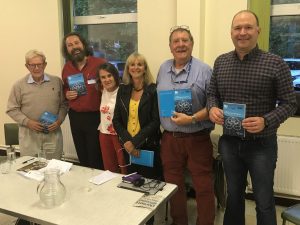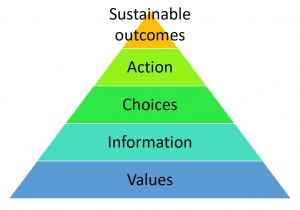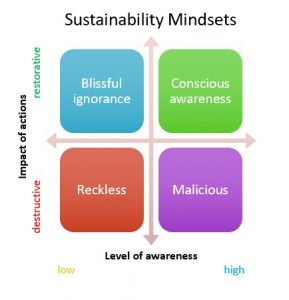Sustainability as ‘an outcome of conscious thinking’ was discussed at the Faculty of Management’s ‘Sustainability Symposium’ recently. The event was organised by Dr Karen Thompson and Professor Janet Dickinson in collaboration with the Association of Sustainability Practitioners and we began exploring ideas for new research on sustainability.
Changing economies across the globe to low or no carbon will require new understandings of the relationships between profit, people and the planet. The new understandings are needed to inform development of new models and ways of doing business that reflect the complexities of social practices. Three characteristics for research on sustainability issues were identified during the event:
- Incorporate partnerships building with practitioners and stakeholders
- Cross-disciplinary thinking that seeks to understand the complexity of social practices
- Fundamental re-thinking of existing models and ways of doing business.
New approaches to research will be required to address the challenges that face society today and will need to incorporate partnership building. Derek Robbins, Faculty of Management, is already doing this in his research with bus companies on developing smart apps. Dr Karen Thompson and Dr Nigel Williams shared their example of using social learning to collaborate with practitioners to develop the new concept of Responsible Project Management.

Their work has recently been shared with local councillors and they are exploring the possibilities for using a framework based on the UN’s 17 Sustainable Development Goals to promote better decision-making.
Research will also need to be cross-disciplinary. New models of business that link social practices with the possibilities arising from technological innovation, such as driverless electric cars, are required. One participant commented:
“this is a really important topic and it was useful to have people here from multiple disciplines because they have different views and are prepared to challenge. Personally I found I learnt a lot from the other speakers even though I’ve been working in this area for quite some time, so thank you very much.” (EC)
Research that seeks incremental improvement is unlikely to deliver enough change quickly enough. Re-thinking existing economic and business models from the bottom-up is required, and new models must balance the need for environmental restoration, reducing conflict between communities as well as being economically viable.

As well as the dependencies between economy, people and planet, there are other dependencies to be understood. There are internal dependencies that underpin our actions and determine outcomes. Values and information underpin the choices humans make, and our choices determine our actions and the outcomes. Understanding and, ultimately changing values, will clearly be very challenging.

Four sustainability ‘mindsets’ have been identified and the challenge is how to move society towards the top right quadrant of conscious awareness. Research is urgently required on understanding what will work and what are the barriers to change. Researchers will need to work closely with practitioners and businesses to experiment and evaluate alternatives, and they urgently need to do so.
For further information, or to discuss how these models can be used, please contact Dr Karen Thompson, Dr Nigel Williams or Professor Janet Dickinson, all from Faculty of Management.











 Expand Your Impact: Collaboration and Networking Workshops for Researchers
Expand Your Impact: Collaboration and Networking Workshops for Researchers Visiting Prof. Sujan Marahatta presenting at BU
Visiting Prof. Sujan Marahatta presenting at BU 3C Event: Research Culture, Community & Can you Guess Who? Thursday 26 March 1-2pm
3C Event: Research Culture, Community & Can you Guess Who? Thursday 26 March 1-2pm UKCGE Recognised Research Supervision Programme: Deadline Approaching
UKCGE Recognised Research Supervision Programme: Deadline Approaching ECR Funding Open Call: Research Culture & Community Grant – Apply now
ECR Funding Open Call: Research Culture & Community Grant – Apply now ECR Funding Open Call: Research Culture & Community Grant – Application Deadline Friday 12 December
ECR Funding Open Call: Research Culture & Community Grant – Application Deadline Friday 12 December MSCA Postdoctoral Fellowships 2025 Call
MSCA Postdoctoral Fellowships 2025 Call ERC Advanced Grant 2025 Webinar
ERC Advanced Grant 2025 Webinar Update on UKRO services
Update on UKRO services European research project exploring use of ‘virtual twins’ to better manage metabolic associated fatty liver disease
European research project exploring use of ‘virtual twins’ to better manage metabolic associated fatty liver disease